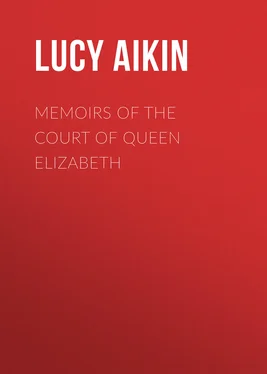Lucy Aikin - Memoirs of the Court of Queen Elizabeth
Здесь есть возможность читать онлайн «Lucy Aikin - Memoirs of the Court of Queen Elizabeth» — ознакомительный отрывок электронной книги совершенно бесплатно, а после прочтения отрывка купить полную версию. В некоторых случаях можно слушать аудио, скачать через торрент в формате fb2 и присутствует краткое содержание. Жанр: foreign_prose, История, foreign_edu, foreign_antique, на английском языке. Описание произведения, (предисловие) а так же отзывы посетителей доступны на портале библиотеки ЛибКат.
- Название:Memoirs of the Court of Queen Elizabeth
- Автор:
- Жанр:
- Год:неизвестен
- ISBN:нет данных
- Рейтинг книги:4 / 5. Голосов: 1
-
Избранное:Добавить в избранное
- Отзывы:
-
Ваша оценка:
- 80
- 1
- 2
- 3
- 4
- 5
Memoirs of the Court of Queen Elizabeth: краткое содержание, описание и аннотация
Предлагаем к чтению аннотацию, описание, краткое содержание или предисловие (зависит от того, что написал сам автор книги «Memoirs of the Court of Queen Elizabeth»). Если вы не нашли необходимую информацию о книге — напишите в комментариях, мы постараемся отыскать её.
Memoirs of the Court of Queen Elizabeth — читать онлайн ознакомительный отрывок
Ниже представлен текст книги, разбитый по страницам. Система сохранения места последней прочитанной страницы, позволяет с удобством читать онлайн бесплатно книгу «Memoirs of the Court of Queen Elizabeth», без необходимости каждый раз заново искать на чём Вы остановились. Поставьте закладку, и сможете в любой момент перейти на страницу, на которой закончили чтение.
Интервал:
Закладка:
On seeing a number of warders and other attendants drawn out in order, she asked, "What meaneth this?" Some one answered that it was customary on receiving a prisoner. "If it be," said she, "I beseech you that for my cause they may be dismissed." Immediately the poor men kneeled down and prayed God to preserve her; for which action they all lost their places the next day.
Going a little further, she sat down on a stone to rest herself; and the lieutenant urging her to rise and come in out of the cold and wet, she answered, "Better sitting here than in a worse place, for God knoweth whither you bring me." On hearing these words her gentleman-usher wept, for which she reproved him; telling him he ought rather to be her comforter, especially since she knew her own truth to be such, that no man should have cause to weep for her. Then rising, she entered the prison, and its gloomy doors were locked and bolted on her. Shocked and dismayed, but still resisting the weakness of unavailing lamentation, she called for her book, and devoutly prayed that she might build her house upon the rock.
Meanwhile her conductors retired to concert measures for keeping her securely; and her firm friend, the earl of Sussex, did not neglect the occasion of reminding all whom it might concern, that the king their master's daughter was to be treated in no other manner than they might be able to justify, whatever should happen hereafter; and that they were to take heed to do nothing but what their commission would bear out. To this the others cordially assented; and having performed their office, the two lords departed.
Having now conducted the heroine of the protestant party to the dismal abode which she was destined for a time to occupy, it will be proper to revert to the period of Mary's accession.
Little more than eight months had yet elapsed from the death of Edward; but this short interval had sufficed to change the whole face of the English court; to alter the most important relations of the country with foreign states; and to restore in great measure the ancient religion, which it had been the grand object of the former reign finally and totally to overthrow. It is the business of the historian to record the series of public measures by which this calamitous revolution was accomplished: the humbler but not uninteresting task, of tracing its effects on the fortunes of eminent individuals, belongs to the compiler of memoirs, and forms an appropriate accompaniment to the relation of the perils, sufferings and obloquy, through which the heiress of the English crown passed on safely to the accomplishment of her high destinies.
The liberation of the state-prisoners confined in the Tower,—an act of grace usual on the accession of a prince,—was one which the causes of detention of the greater part of them rendered it peculiarly gratifying to Mary to perform. The enemies of Henry's or of Edward's government she regarded with reason as her friends and partisans, and the adherents, open or concealed, of that church establishment which was to be forced back on the reluctant consciences of the nation.
The most illustrious of the captives was that aged duke of Norfolk whom the tyrant Henry had condemned to die without a crime, and who had been suffered to languish in confinement during the whole reign of Edward; chiefly, it is probable, because the forfeiture of his vast estates afforded a welcome supply to the exhausted treasury of the young king; though the extensive influence of this nobleman, and the attachment for the old religion which he was believed to cherish, had served as plausible pretexts for his detention. His high birth, his hereditary authority, his religious predilections, were so many titles of merit in the eyes of the new queen, who was also desirous of profiting by his abilities and long experience in all affairs civil and military. Without waiting for the concurrence of parliament, she declared by her own authority his attainder irregular and null, restored to him such of his lands as remained vested in the crown, and proceeded to reinstate him in offices and honors. On August 10th he took his seat at the council-board of the eighth English monarch whose reign he had survived to witness; on the same day he was solemnly reinvested with the garter, of which he had been deprived on his attainder; and a few days after, he sat as lord-high-steward on the trial of that very duke of Northumberland to whom, not long before, his friends and adherents had been unsuccessful suitors for his own liberation.
There is extant a remarkable order of council, dated August 27th of this year, "for a letter to be written to the countess of Surry to send up to Mountjoy Place in London her youngest son, and the rest of her children, by the earl of Surry, where they shall be received by the duke of Norfolk their grandfather 21 21 See Burleigh Papers by Haynes.
." It may be conjectured that these young people were thus authoritatively consigned to the guardianship of the duke, for the purpose of correcting the protestant predilections in which they had been educated; and the circumstance seems also to indicate, what indeed might be well imagined, that little harmony or intercourse subsisted between this nobleman and a daughter-in-law whom he had formerly sought to deprive of her husband in order to form for him a new and more advantageous connexion.
The eldest son of the earl of Surry, now in the seventeenth year of his age, was honored with the title of his father; and he began his distinguished though unfortunate career by performing, as deputy to the duke of Norfolk, the office of earl-marshal at the queen's coronation. On the first alarm of Wyat's rebellion, the veteran duke was summoned to march out against him; but his measures, which otherwise promised success, were completely foiled by the desertion of the London bands to the insurgents; and the last military expedition of his life was destined to conclude with a hasty and ignominious flight. He soon after withdrew entirely from the fatigues of public life, and after all the vicissitudes of court and camp, palace and prison, with which the lapse of eighty eventful years had rendered him acquainted, calmly breathed his last at his own castle of Framlingham in September 1554.
Three deprived bishops were released from the Tower, and restored with honor to their sees. These were, Tonstal of Durham, Gardiner of Winchester, and Bonner of London. Tonstal, many of whose younger years had been spent in diplomatic missions, was distinguished in Europe by his erudition, which had gained him the friendship and correspondence of Erasmus; he was also mild, charitable, and of unblemished morals. Attached by principle to the faith of his forefathers, but loth either to incur personal hazard, or to sacrifice the almost princely emoluments of the see of Durham, he had contented himself with regularly opposing in the house of lords all the ecclesiastical innovations of Edward's reign, and as regularly giving them his concurrence when once established. It was not, therefore, professedly on a religious account that he had suffered deprivation and imprisonment, but on an obscure charge of having participated in some traitorous or rebellious design: a charge brought against him, in the opinion of most, falsely, and through the corrupt procurement of Northumberland, to whose project of erecting the bishopric of Durham into a county palatine for himself, the deprivation of Tonstal, and the abolition of the see by act of parliament, were indispensable preliminaries. This meek and amiable prelate returned to the exercise of his high functions, without a wish of revenging on the protestants, in their adversity, the painful acts of disingenuousness which their late ascendency had forced upon him. During the whole of Mary's reign, no person is recorded to have suffered for religion within the limits of his diocess. The mercy which he had shown, he afterwards most deservedly experienced. Refusing, on the accession of Elizabeth, to preserve his mitre by a repetition of compliances of which so many recent examples of conscientious suffering in men of both persuasions must have rendered him ashamed, he suffered a second deprivation; but his person was only committed to the honorable custody of archbishop Parker. By this learned and munificent prelate the acquirements and virtues of Tonstal were duly appretiated and esteemed. He found at Lambeth a retirement suited to his age, his tastes, his favorite pursuits; by the arguments of his friendly host he was brought to renounce several of the grosser corruptions of popery; and dying in the year 1560, an honorable monument was erected by the primate to his memory.
Читать дальшеИнтервал:
Закладка:
Похожие книги на «Memoirs of the Court of Queen Elizabeth»
Представляем Вашему вниманию похожие книги на «Memoirs of the Court of Queen Elizabeth» списком для выбора. Мы отобрали схожую по названию и смыслу литературу в надежде предоставить читателям больше вариантов отыскать новые, интересные, ещё непрочитанные произведения.
Обсуждение, отзывы о книге «Memoirs of the Court of Queen Elizabeth» и просто собственные мнения читателей. Оставьте ваши комментарии, напишите, что Вы думаете о произведении, его смысле или главных героях. Укажите что конкретно понравилось, а что нет, и почему Вы так считаете.












